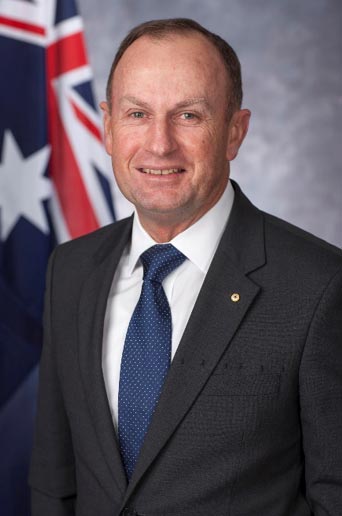Mark Kelly

Photographer unknown. (2023). Major General Mark Kelly, AO DSC. Defence Honours & Awards Appeals Tribunal.
Major General Mark Kelly, AO DSC has a unique perspective on Australian service in Timor-Leste. During International Force East Timor (INTERFET) he was the Chief of Staff of the 1st Division and the Deployable Joint Force Headquarters, which formed the basis of Headquarters INTEREFET, and served as the Chief of Staff of INTERFET during Operation Stabilise.
‘I entered the Australian Defence Force (ADF) in the mid-1970s, the Vietnam War was over and our nation entered what we in the Army euphemistically referred to as “the long peace”.
‘During this time, the ADF maintained a high training tempo and kept some elements at a higher state of readiness, but for many of us it felt like you were always training for a grand final that we didn’t ever get the chance to play.’
As violence from the pro-Indonesia militia in East Timor began to escalate in the lead up to and in the wake of the referendum to determine the nation’s future, in 1999, things changed rapidly.
‘If you had said just six months prior that we would be going into East Timor in September, I don’t think anyone would have believed you.
‘But it was a real testament to our Army’s training continuum in particular, because in the 12 months just prior, our Headquarters had completed a series of wargame training exercises with international partners from Malaysia, New Zealand, Singapore and the United Kingdom as well as the United States that closely replicated some of the conditions and scenarios that our troops were about to go into.’
INTERFET Commander at the time, Major General Peter Cosgrove AC MC, flew into Dili on 19 September and negotiated the conditions under which INTERFET could enter East Timor, ensuring there would be no contested landing. Then, on 20 September, the first Australian forces arrived.
Mark still remembers flying into Dili. ‘The city was deserted, most of the population had fled to the surrounding hills or had been deported to West Timor, and those who were still there were deeply traumatised. Our first mission was to secure the city.’
As Chief of Staff, Mark had to coordinate the functions of the Headquarters staff and liaise closely with many different groups in East Timor to ensure there was a coordinated effort. This included the 21 other partner nations who had contributed forces to INTERFET, United Nations (UN) officials in Dili, the Indonesian Police Force and Defence Force, and the local Timorese leadership.
‘The thing which impressed itself on me at the time, and still today, was the discipline and professionalism of the young men and women of the Australian Defence Force who deployed to East Timor. For many of them it was their first operational deployment, and they conducted and held themselves to the highest standard.’
‘The pro-Indonesian militia by contrast were a chaotic rabble, and when confronted with a professional, well trained, disciplined force, exercising restraint, their resistance quickly crumbled.’
One of the experiences that has stayed with Mark was when Xanana Gusmao, who would become the inaugural president of Timor-Leste, returned to Dili for the first time on 22 October 1999 after serving years in an Indonesian prison.
‘The whole population of Dili turned out when Xanana returned; the jubilation in the streets was palpable. For them it was the culmination of decades of struggle for independence finally realised, and it was very moving to see and feel what that moment meant to them.’
Mark returned to Timor-Leste several times over the years in other roles, visiting deployed forces, and most recently in 2012 when he had the privilege of accompanying eight wonderful Second World War veterans who had served in Timor during operation Sparrow Force.
‘We took a group of surviving 90-year-old veterans from the Second World War back to Timor-Leste in 2012. In the decade since INTERFET, Dili had transformed from a deserted, burnt-out city into a bustling, vibrant metropolis. The veterans that we took over had fought alongside the Timorese when the Japanese had invaded and occupied Timor during the Second World War. The locals had hidden them in the hills and supported them while they were there, knowing that if they were discovered it would mean harsh reprisals from the Japanese.
‘I saw this warm relationship between the Australian and Timorese people who had been there at the time. It was a special thing to see the kindness and courage they had shown to our soldiers in a different war, with the knowledge that we were able to come back decades later and return that kindness to help them gain independence.’
Mark believes the 25th anniversary of Australian service in Timor-Leste is an important time to reflect on what Australia achieved.
‘All those who served can be proud of the professional manner they conducted themselves in, and the opportunity we were able to give our close neighbour to determine their own future. This is also a time for any veterans who may have lost touch with their mates to reconnect and remember their service.’
Source: DVA interview with Major General Mark Kelly, AO DSC, September 2024.
